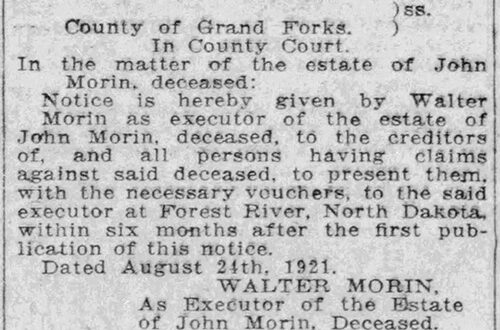Deathbed wills are documents that were dictated orally by a testator who was in imminent peril of death, who did not expect to make it through the night, who did not hope to see another day. There is a more technical name for them — noncupative wills1 — and they are often unspeakably poignant to read (this 42-year-old man, Thomas Hourigan, knew that he was about to die when he bequeathed his bicycle to his 10-year-old nephew Bernard Lunny [Lunney]…). They also frequently contain interesting leads on family history relationships.
A couple of examples, from my own family tree:
Thomas Hourigan (1857-1899)
Thomas Hourigan, of March Township, Carleton Co., Ontario, son of Thomas Hourigan and Julia Moran, dictated his will on 11 March 1899.2 He died of pneumonia, of one week’s duration, on 11 March 1899. He left his farm to his sister Margaret Amelia [Hourigan] Lunney.

Stephen McKinley (ca. 1844-1901)
Stephen McKinley, of the townland of Clarkill, parish of Forkill, County Armagh, son of Teague McKinley and Mary McGinniss, dictated his will on 22 August 1901.3 He died of “Inflammation of the stomach,” of one week’s duration, on 22 August 1901. He left his farm to his cousin’s son Timothy McKinley.

- See, for example, Sharon DeBartolo Carmack, Where There’s A Will ↩
- Land Records of Carleton County, 1819-1977, Carleton County (Ontario). Registrar of Deeds (Main Author).
March Township (v. 51, 901-1030) 1889-1891; (v. 52, 1364-1683) 1897-1903. No. 1455. ↩ - PRONI, Will Calendars. Probate of the Will of Stephen M’Kinley late of Clarkhill County Armagh Farmer who died 22 August 1901 granted at Armagh to Timothy M’Kinley Farmer ↩



